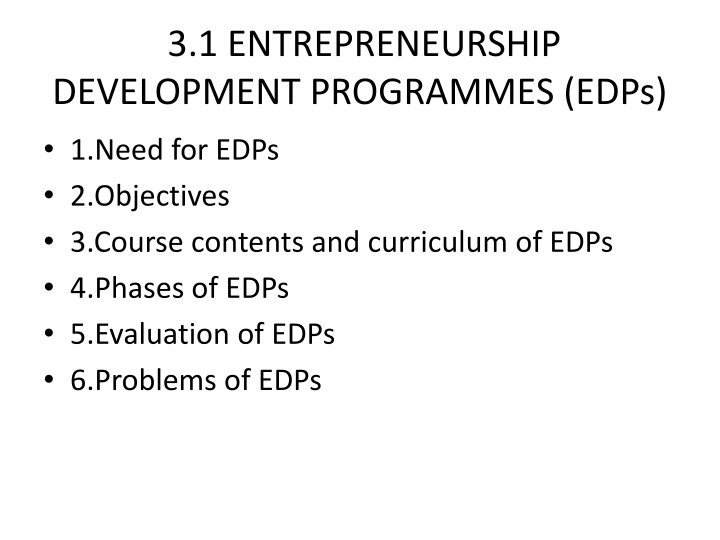
Entrepreneurship Development Programmes (EDPs): Need, Objectives, Curriculum, and Phases
Explore the significance of Entrepreneurship Development Programmes (EDPs) in fostering entrepreneurial qualities, analyzing environments, selecting products, understanding procedures, acquiring managerial skills, and more. Learn about the need for EDPs, their objectives, course contents, curriculum, and phases. Enhance your understanding of entrepreneurship through motivational training, management skills development, feasibility study fundamentals, and hands-on plant visits.
Download Presentation

Please find below an Image/Link to download the presentation.
The content on the website is provided AS IS for your information and personal use only. It may not be sold, licensed, or shared on other websites without obtaining consent from the author. If you encounter any issues during the download, it is possible that the publisher has removed the file from their server.
You are allowed to download the files provided on this website for personal or commercial use, subject to the condition that they are used lawfully. All files are the property of their respective owners.
The content on the website is provided AS IS for your information and personal use only. It may not be sold, licensed, or shared on other websites without obtaining consent from the author.
E N D
Presentation Transcript
3.1 ENTREPRENEURSHIP DEVELOPMENT PROGRAMMES (EDPs) 1.Need for EDPs 2.Objectives 3.Course contents and curriculum of EDPs 4.Phases of EDPs 5.Evaluation of EDPs 6.Problems of EDPs
Need for EDPs 1.David MeClelland-Harvard university Investigation into why certain societies displayed great creative powers. The need for achievement(nach factor) Need to achieve motivate people to work hard Money making is incidental-measure of achievement not its motivation
2. Another question is that whether the characteristics of an entrepreneur can be induced and developed. Experimental study in one of the prosperous district of AP with Small Industries Extension and Training Institute- Kakinada Experiment Three months training to young persons Suitable training can provide the necessary motivation to the entrepreneurs There is need for the entrepreneurial development programme.
Objectives Develop and strengthen their entrepreneurial quality- motivation or need for achievement Analyse environmental set up Select products Formulate project Understand the procedure in setting up of a small enterprise Know the sources of help and support available Acquire the necessary managerial skills know the pros and cons of being an entrepreneur Appreciate the needed entrepreneurial discipline
Course content and curriculum of EDPs General introduction to entrepreneurship Motivational training-induce need for achievement, inject confidence and positive attitude Management skills finance, production, marketing Support system and procedures Fundamentals of feasibility study-technical, financial, organisational ,marketing and social aspects Plant visits
Phases of EDPs Three phases 1.Pre-training phase 2.Training phase 3.Post training phase (follow-up)
1.Pre training phase Selection of entrepreneurs Arrangement of infrastructure Tie-up of guest faculty for the training programme Finalisation of training syllabus Selection of necessary tools and technique Arrangement for publicity and campaining Pre-potential survey
2.Training Phase Attitudinally tuning trainees towards proposed project Motivate to plunge into entrepreneurial career and bear risk Change in the attitude, skill,etc Training in entrepreneurial traits lacked by trainees Training in selecting the viable project and mobilizing resources Providing knowledge of technology and resources
3. Post-training phase Review the pre-training work Review the process of training programme Review past training approach
Evaluation (qualitative ) of EDPs Activity level of respondents New enterprise established Total investment made Number of jobs created Increase in sales and profits Quality of products Repayment of loans
Evaluation(Behavioural) Entrepreneur behavior is measured using four dimensions Planning orientation Achievement orientation Expansion orientation Management orientation
Problems in EDPS Motivation not found upto the mark Lack of commitment and sincerity in conducting EDPs Non-conducive environment Ineffective Attitude of supporting agencies Selection wrong trainees
